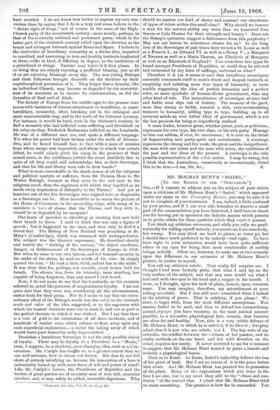MR. HOLMAN HUNT'S "ISABEL."
[To THE EDITOR OF THE "SPECTATOR."] SIR,—If I venture to address you on the subject of your article upon a criticism of Mr. Holman Hunt's "Isabel," which appeared under my name in the Fortnightly Review, you may be sure it is not to complain of your treatment. I am, indeed, a little confused by your praise, and if I am ever able hereafter to deserve a small part of the commendation you have bestowed, I shall have to thank you for having put in operation the delicate maxim which permits us to praise others for those qualities which they ought to possess.
You think my criticism erroneous, and while you rally me good- naturedly for calling myself nobody, you assure me I am somebody, but wrong. You may think me hard to please, as times go, but I should have much preferred to be nobody—and right. To have been right in your estimation would have been quite sufficient solace in my eyes for being, that most comfortable of earthly beings, nobody. Allow me, however, to make one or two remarks upon the difference in our estimates of Mr. Holman Hunt's picture, in justice to myself.
You call my criticism subtle. That really did surprise me. I thought I had been brutally plain, that what I said lay on the very surface of the subject, and that any man would say what I had said with two eyes in his head and a tongue in his mouth. I went, as I thought, upon the tack of plain, honest, open, common sense. You may imagine, therefore, my astonishment at your calling me subtle. But I was still more astonished when I looked at the subtlety of yours. That is subtlety, if you please ! We start, to begin with, from the most different assumptions. You assume Isabel to be mad, and then to defend her extraordinary animal physique you have recourse, in the most natural manner possible, to a recondite physiological fact, namely, that lunatics are often fat and healthy. Now, this is a very subtle defence of Mr. Holman Hunt, to which he is entitled, if he likes it ; but pray admit that it is you who are subtle, not I. The key-note of my critichan, the conflict between the coldness of her passion, and its crafty methods on the one hand, and her wild devotion on the other, requires her sanity. It never occurred to me for a moment to suppose that Mr. Holman Hunt wanted to paint a lunatic and embody a physiological lesson.
Then as to Keats. In Keats, Isabel's imbecility follows the loss of her plant of basil. But I see no traces of it in the poem before that event. And Mr. Holman Hunt has painted her in possession of the plant. Many of the expressions which you trace in the face I see also, but to my mind they add to the "chaos and con- fusion" of the central idea. I admit that Mr. Holman Hunt tried to mean something. The question is how far he succeeded. You
tell me he was painting a lunatic. That idea never once occurred to me. And yet time after time I have gone and studied the picture over and over again. So much for the subtlety of
Your obedient servant,
SOMEBODY.
[Mr. Cracroft is mistaken. Our view is the natural, simple, straightforward conception of Mr. Holman Hunt's picture. Those eyes need no refining upon to interpret. Mr. Cracroft looked so hard beneath the surface that he could not see what was on it. —En. Spectator.]































 Previous page
Previous page